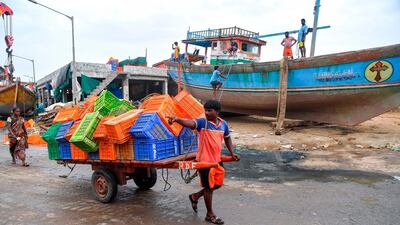UK warns China: do not destroy the jewel of Hong Kong
The United Kingdom warned Beijing on Tuesday to step back from the brink over an "authoritarian" national security law in Hong Kong that it said risked destroying one of the jewels of Asia's economy while ruining the reputation of China.
Chinas parliament last week approved a decision to create laws for Hong Kong to curb sedition, secession, terrorism and foreign interference. Mainland security and intelligence agents may be stationed in the city for the first time.
"There is time for China to reconsider, there is a moment for China to step back from the brink and respect Hong Kong's autonomy and respect China's own international obligations," British Foreign Secretary Dominic Raab told parliament.
"The sad reality is that if China continues down this track, it will be strangling what has long been the jewel in the economic crown," Mr Raab said, when asked about the future of the Hong Kong dollar peg.
Indian metropolis of Mumbai braces for rare cyclone
A cyclone in the Arabian Sea was barreling toward India's business capital Mumbai on Tuesday, threatening to deliver high winds and flooding to an area already struggling with the nation's highest number of coronavirus infections and deaths.
Cyclone Nisarga was forecast to make landfall Wednesday afternoon on the country's west coast near Mumbai, a coastal city home to 18.4 million people and known for the Bollywood film industry. Mumbai hasn't been hit by a cyclone in more than a century, raising concern about its readiness.
National Disaster Response Force personnel have been sent to both Maharashtra state, home to Mumbai, and nearby Gujarat state and officials were urging people in at risk areas to evacuate.
Maharashtra's top official, Uddhav Balasheb Thackeray, said on Twitter that residents in Mumbai's expansive slums had been ordered to evacuate, though it was not immediately clear if shelters had been set up. He also said some 150 coronavirus patients had been moved out of a hospital near the city's beachfront.
UN report: Afghan Taliban still maintain ties with Al Qaeda
The Taliban in Afghanistan still maintain close ties with the Al Qaeda terror network, despite signing a peace deal with the United States in which they committed to fight militant groups, a UN report released on Tuesday said.
The US-Taliban peace accord signed in Qatar in February was meant to allow for American troops to gradually leave Afghanistan after 19 years of war and pave way for intra-Afghan negotiations that would shape the country's political future.
Under the accord, the Taliban pledged to combat other terror groups — including Al Qaeda, which they once harboured — and prevent militants from using Afghan territory to stage attacks on America.
But the details of the Taliban counter-terrorism commitment were never publicised. Zalmay Khalilzad, Washington's peace envoy and the architect of the deal, says the secrecy is necessary to protect intelligence operations involved in enforcing it.
Mr Khalilzad told reporters in Washington on Monday that the Taliban pledge was specific "in terms of their presence, in terms of training, in terms of recruiting, in terms of fundraising in the territory that they currently control."
Kremlin says Trump's possible G7 invitation raises more questions than answers
The Kremlin said on Tuesday that U.S. President Donald Trump's proposal to invite Russia to an expanded Group of Seven summit later this year raised more questions than it provided answers, but that its diplomats would seek clarification from Washington.
Mr Trump said on Saturday he wanted to expand the list of invitees to a G7 summit that he wants postponed until September or later to include Australia, Russia, South Korea and India.
Mr Trump told Mr Putin about the idea in a phone call on Monday, according to readouts of the conversation published by the Kremlin and the White House.
Russia was expelled from what was then known as the Group of Eight in 2014 after it annexed Crimea from Ukraine. Britain and Canada have spoken out in opposition to the idea of letting Russia back into the forum.
The Kremlin's spokesman, Dmitry Peskov, said Russia would seek further details about Trump's proposal from Washington through diplomatic channels.

